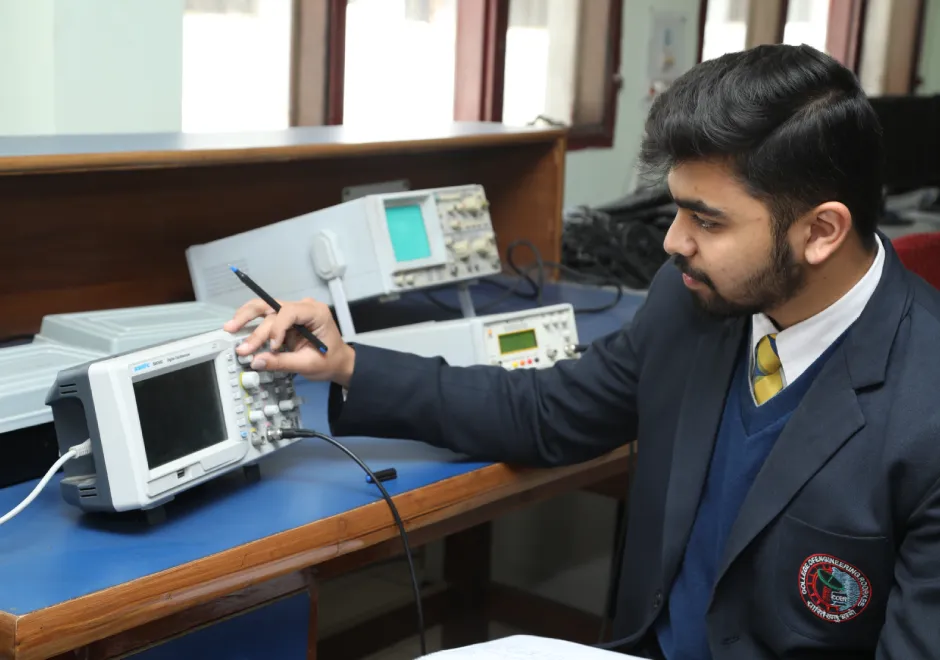
Bachelor of Pharmacy (B. Pharm)
Eligibility Criteria |
Bachelor of Pharmacy 4 YearsPassed HSC (10+2) or its equivalent examination with English as one of the subject & Physics and Chemistry as compulsory subjects along with Mathematics or Biology as optional subjects individually. However, the students possessing 10+2 qualification from non-formal and non-class rooms based schooling shall not be eligible for admission to B. Pharm. Any other Qualification approved by Pharmacy Council of India as equivalent to any of the above examinations. |
Lateral entry (Third Semester)Passed Diploma Course in Pharmacy with at least 45% marks (at least 40% marks in case of candidates of Backward class categories and Persons with disability) from an All India Council for Technical Education or Pharmacy Council of India or Central or State Government approved Institution or its equivalent. |
Duration |
4 Years |
3 Years |
| Apply Now |
The Bachelor of Pharmacy (B. Pharm) is a four-year undergraduate degree for those aiming for a career in pharmacy. B. Pharm graduates play a crucial role in researching and testing cures for diseases before treatments reach the market.

Integral to the healthcare industry, B. Pharm professionals contribute significantly to medicinal drug research, development, manufacturing, and supply. They specialize in the study and production of pain medications and the treatment of medical conditions through drug modification. Additionally, they ensure quality control and compliance with Pharmacy Council of India (PCI) regulations, making the pharmacy sector a vital component of healthcare.
Apply NowCareer Path
After completing the degree course graduates can work in the following areas.
- Drug Inspector
- Pharmacist
- Pharmaceutical Marketing
- Production and Quality Control
- Medical Underwriting.
- Own Business and Self-employment
- Hospital Drug Coordinator
- Drug Therapist
- Health Inspector
- Master in Pharmacy
- R&D
- Research Organizations

Curriculum
-
Human Anatomy and Physiology I– Theory
-
Pharmaceutical Analysis I – Theory
-
Pharmaceutics I – Theory
-
Pharmaceutical Inorganic Chemistry – Theory
-
Communication skills – Theory *
-
Remedial Biology/ Remedial Mathematics – Theory*
-
Human Anatomy and Physiology – Practical
-
Pharmaceutical Analysis I – Practical
-
Pharmaceutics I – Practical
-
Pharmaceutical Inorganic Chemistry – Practical
-
Communication skills – Practical*
-
Remedial Biology – Practical*
-
Human Anatomy and Physiology II – Theory
-
Pharmaceutical Organic Chemistry I – Theory
-
Biochemistry – Theory
-
Pathophysiology – Theory
-
Computer Applications in Pharmacy – Theory *
-
Environmental sciences – Theory *
-
Human Anatomy and Physiology II –Practical
-
Pharmaceutical Organic Chemistry I– Practical
-
Biochemistry – Practical
-
Computer Applications in Pharmacy – Practical*
-
Pharmaceutical Organic Chemistry II – Theory
-
Physical Pharmaceutics I – Theory
-
Pharmaceutical Microbiology – Theory
-
Pharmaceutical Engineering – Theory
-
Pharmaceutical Organic Chemistry II – Practical
-
Physical Pharmaceutics I – Practical
-
Pharmaceutical Microbiology – Practical
-
Pharmaceutical Engineering –Practical
-
Pharmaceutical Organic Chemistry III– Theory
-
Medicinal Chemistry I – Theory
-
Physical Pharmaceutics II – Theory
-
Pharmacology I – Theory
-
Pharmacognosy and Phytochemistry I– Theory
-
Medicinal Chemistry I – Practical
-
Physical Pharmaceutics II – Practical
-
Pharmacology I – Practical
-
Pharmacognosy and Phytochemistry I – Practical
-
Medicinal Chemistry II – Theory
-
Industrial Pharmacy I– Theory
-
Pharmacology II – Theory
-
Pharmacognosy and Phytochemistry II– Theory
-
Pharmaceutical Jurisprudence – Theory
-
Industrial PharmacyI – Practical
-
Pharmacology II – Practical
-
Pharmacognosy and Phytochemistry II – Practical
-
Medicinal Chemistry III – Theory
-
Pharmacology III – Theory
-
Herbal Drug Technology – Theory
-
Biopharmaceutics and Pharmacokinetics – Theory
-
Pharmaceutical Biotechnology – Theory
-
Quality Assurance –Theory
-
Medicinal chemistry III – Practical
-
Pharmacology III – Practical
-
Herbal Drug Technology – Practical
-
Instrumental Methods of Analysis – Theory
-
Industrial Pharmacy II – Theory
-
Pharmacy Practice – Theory
-
Novel Drug Delivery System – Theory
-
Instrumental Methods of Analysis – Practical
-
Practice School*
-
Biostatistics and Research Methodology
-
Social and Preventive Pharmacy
-
Pharma Marketing Management
-
Pharmaceutical Regulatory Science
-
Pharmacovigilance
-
Quality Control and Standardization of Herbals
-
Computer Aided Drug Design
-
Cell and Molecular Biology
-
Cosmetic Science
-
Experimental Pharmacology
-
Advanced Instrumentation Techniques
-
Dietary Supplements and Nutraceuticals
-
Project Work
Program Specific Outcome PSOs
-
PSO1
Perform research on various medical aspects and implement the Pharmaceutical knowledge in formulating the best suitable dosage form to provide high quality medicines to the society..
-
PSO2
Render the services to the public by providing patient centric effective treatments to curb the therapeutic issues with the required medicines and explain the effects of the drugs by analyzing the scientific literature for improving their health and well-being..
Program Educational Objectives PEOS
-
PEO1
To empower students with various facets of pharmaceutical sciences in the core and applied competency areas.
-
PEO2
To inculcate professional and interpersonal skills in students by providing a healthy and competitive environment.
-
PEO3
To mould students to serve the community by creating awareness about healthcare issues.
-
PEO4
To foster an ambitious desire in students for higher studies and career growth.
Value Added Programs (VAPs)
| Year | Name of VAP |
|---|---|
|
|









